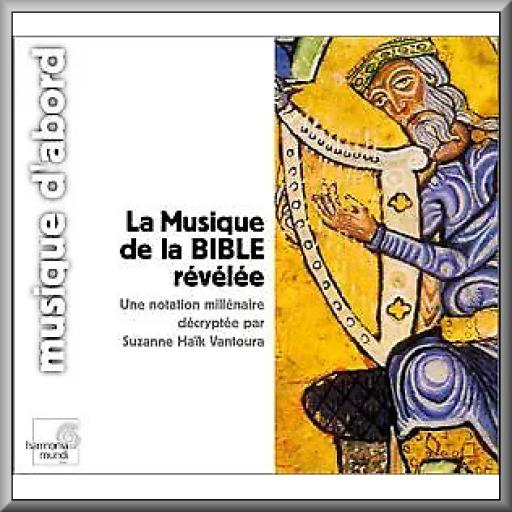
About
I was the American representative of Suzanne Haik-Vantoura, author of THE MUSIC OF THE BIBLE REVEALED (her decipherment of the accents of the Hebrew Masoretic Text). I edited and co-published the English translation of her French book. I am one of the few now living who knows her work at a high level. As Ken Rich addresses what I have written about CCM, I look forward to reading and answering his concerns. He is welcome to contact me by email.

Hi Ken,
I'll save further comments until I finish your book. That will take some time. When I do comment, I'll try to make the verbiage brief and summary. Again, it is interesting reading, and I do bear in mind that you wrote it long ago.
Meanwhile, my old acquaintances at The Temple Institute of Jerusalem, having turned their back on SHV's work (even though they sought me out about it, not the other way around, decades ago), have recorded this interesting video of what they think the Levitical choir was like:
YouTube
Of course, I just wrote them asking why they don't use the only interpretation of the Masoretic accents that accounts for all their features.
jhw (יוחנן רכב)
I have reached the place in your book when you and someone else write of some comments I've made, somewhere (I presume on my old Web site on SHV's work). Preliminary comments:
While the Bible doesn't deny the use of "drums" (of course), nobody in the ANE-EM had anything like our modern "drum kits". Israel and its neighbors limited itself to timbrels (the same as tambourines but without the rattles - Irish Celtic frame drums are a good modern analogue). Even then, they weren't part of the normal psalmodic ensemble (wood-lyres, skin-lyres, paired cymbals, and metal trumpets). Psalmody in its near-entirety was not dance music as we know it. Rare are exceptions like Psalm 149 that might have had a complex (never simple) meter dance. Psalm 150 is unique in having a melody that "backs off" so that various uncommonly used instruments could "add color" here and there.
Worse for me is that you cite me out of context and misrepresent what you do cite. First, I write of empirical fact: the melodic notation of the Hebrew Masoretic Text. It is primarily melodic, then syntactic, then rhythmic. The syntax is indicated by the harmonic progression, of a kind that indeed sounds very "Western" to our modern ears (it is neither modern nor exclusively Western) and which demands at least "heterophony" (parallel melodies rather than our triadic harmony) such as is documented in Egypt and Greece especially.
Then, you miss the clearly stated point that while the Greeks had special terms for the blending of melody, harmony, rhythm, and lyrics on the one hand and the "moral force" of the resulting music on the other, these concepts were common to all cultures and places in the ancient world. I am not making this up. Curt Sachs, one of the founding fathers of ethnomusicology, noted and illustrated this, in his THE RISE OF MUSIC IN THE ANCIENT WORLD: EAST AND WEST and in his THE HISTORY OF MUSICAL INSTRUMENTS. (The second book illustrates just how besotted with sex primitive and advanced paganism was. It is disgusting to read. Clement of Alexandria overreacted to this, but he had good reason in a way.)
Third, you write of music of the ANE, but until the accentuation was deciphered, absolutely no one knew how advanced that music could be in practice. But we already knew from archaeology that ancient music was very different from, and much less exotic than, the Arabo-Persian maqamat which arose with Islam and influenced everything around it (including Jewish music). It was based on pure scales and simple notes, intervals, and arpeggiated chords, and could use both melody and heterophony. Even in Greece, it took a long time for music to degrade (that's what the old-school pentatonic-diatonic-chromatic purists thought) to music similar to the maqamat we know of today.
Fourth, your preceding arguments about the validity of different musical cultures borders on the naturalist fallacy: "What is, is good because it is." Let's think about that for a moment.
Different verbal languages do demand different musical languages. Paul's admonition on "psalms, hymns, and spiritual songs" of necessity demanded Greek music for Greek words: at minimum, the "obscure song" indicated by the three vocal accents. His audience couldn't adapt the Temple melodies even if they knew them. They did adapt synagogue chant, extensively, and Greek songs too. Those forms could be adapted to different languages: Hebrew, Greek, Latin, English, Spanish, whatever.
But the day is coming (according to the Bible) when the world will have one purified verbal language, so that all may serve the Eternal with one consent. Music will follow suit. In the meantime - it is quite possible to apply the universal principles of what actually is biblical sacred music (which reminds more than one reviewer of Hindu ragas on the one hand and various forms of ancient, medieval and Renaissance tonal music in the West on the other) to any verbal language extant, without copying either the ancient melodies or necessarily even the ancient styles. That is the core of my argument regarding CCM or anything else one might use in worship of the One True God.
jhw (יוחנן רכב)